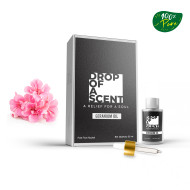-1060x400w.jpg)
In the picturesque landscapes of southern Italy lies a treasure trove of olfactory delight - the fragrant essence of Italian Bergamot oil. Extracted from the rind of Citrus bergamia, a small citrus fruit resembling a miniature orange, this oil is renowned for its captivating aroma and diverse applications. Let's delve into the enchanting world of Italian Bergamot oil, exploring its origins, production methods, therapeutic benefits, and versatile uses.
Origins and Production: Italian Bergamot, named after the Italian city of Bergamo where it was originally cultivated, thrives in the sun-kissed orchards of the Calabrian region. Harvested during the winter months when the fruit is at its peak ripeness, the oil is extracted from the cold-pressed rind. This meticulous extraction process preserves the delicate fragrance and therapeutic properties of the oil, ensuring its exceptional quality.
Aroma and Characteristics: Italian Bergamot oil is celebrated for its vibrant and complex aroma. Its citrusy top notes exude a fresh and zesty scent, reminiscent of sun-drenched Mediterranean groves. Beneath this initial burst of citrus lies a subtle floral undertone, adding depth and sophistication to its fragrance profile. The oil's distinctively bright and uplifting aroma makes it a prized ingredient in perfumery, aromatherapy, and skincare formulations.
Therapeutic Benefits: Beyond its aromatic allure, Italian Bergamot oil boasts a plethora of therapeutic benefits. Rich in antioxidants and volatile compounds, it possesses antiseptic, analgesic, and anti-inflammatory properties. When diffused, its aroma can alleviate stress, anxiety, and depression, promoting relaxation and mental well-being. Additionally, its antibacterial properties make it a valuable ingredient in natural cleaning products and skincare remedies, aiding in the treatment of acne and skin infections.
Versatile Uses: Italian Bergamot oil's versatility extends far beyond the realms of aromatherapy and skincare. Its bright and citrusy flavor enhances culinary creations, adding a refreshing twist to beverages, desserts, and savory dishes. A few drops of the oil can elevate the taste of Earl Grey tea, imparting a distinctive citrusy note to this beloved brew. In cosmetics, it is prized for its ability to balance oily skin, regulate sebum production, and promote a clear and radiant complexion. Furthermore, its natural deodorizing properties make it a popular choice for scenting candles, soaps, and perfumes.
Cultural Significance: Italian Bergamot oil holds a special place in Italian culture and tradition. It is an integral ingredient in the iconic fragrance of Eau de Cologne, a classic scent that originated in Cologne, Germany, but owes much of its character to Italian Bergamot oil. In addition to its olfactory allure, Bergamot oil is deeply intertwined with Italian cuisine, where it adds a burst of citrusy flavor to regional delicacies such as risotto, gelato, and seafood dishes.
Conclusion: Italian Bergamot oil stands as a testament to the timeless allure of citrus essences, captivating the senses with its vibrant aroma and multifaceted benefits. From perfumery to culinary arts, skincare to aromatherapy, its versatility knows no bounds. As we savor its citrusy symphony, let us celebrate the rich heritage and boundless potential of this aromatic gem from the sun-drenched orchards of Italy.


























